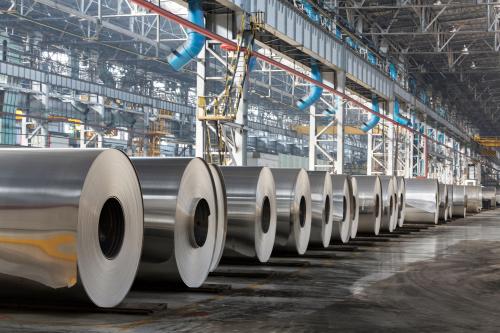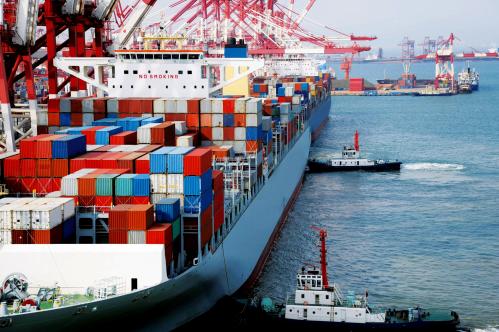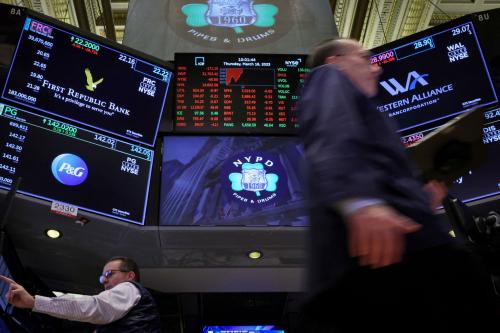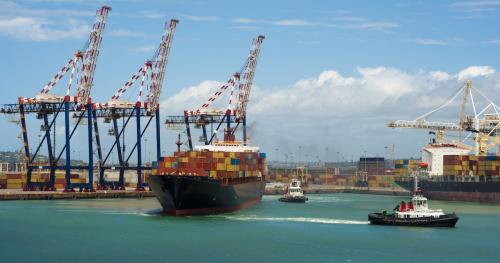Trade policy rarely tips elections.
But as with many things, 2018 will prove an interesting test of conventional wisdom, especially with tariffs now implemented on more than $350 billion worth of bilateral trade between the United States and China.
While trade is not likely to motivate voters as much as healthcare or immigration, it could influence outcomes in tight congressional races. How tariffs affect election results will depend on economic conditions in local communities and how local leaders across business, government, and civil society discuss and respond to the trade war.
This post explores the dynamics in two congressional districts characterized by significant reliance on trade—Kansas’s 2nd and Minnesota’s 3rd—to illustrate the relationship between national trade policy and local business and civic responses.
Kansas’s 2nd congressional district exemplifies an export-intensive, toss-up race where trade policy may matter. Encompassing most of eastern Kansas, the district is about 40 percent rural, and relies on manufacturing and agriculture exports. This is exactly the type of community that the Chinese government has targeted with retaliatory tariffs. In all but four of the 25 counties that make up the district, the share of exports in retaliatory tariff-affected industries exceeds the national average of 6.1 percent. Ten of the counties have at least twice the national share.
The trade war is not only disrupting Kansas’s exporters, but also making it harder for local manufacturers to import critical materials and components. We talked to one of those businesses, which employs 200 workers in the 2nd district. This firm manufactures industrial machinery in the U.S. by sourcing fabricated steel, machinery motors, brakes, and cylinders from China.
Many of these imports are now subject to 25 percent tariffs, which will harm the profitability of U.S. manufacturing by putting foreign firms—who can effectively import Chinese components at 25 percent lower cost—at a competitive advantage in the North American market. These U.S. companies now face a dilemma, according to the World Trade Center-Kansas City’s Kaitlin Bast, who assists businesses with international trade needs:
“Firms are being as proactive as they can by searching supply chain alternatives if they have a product in their supply chain that is affected. They are looking for suppliers in countries that are not currently targeted with tariffs but the uncertainty of who and what product may be next makes it difficult to make strategic decisions.”
However, finding new suppliers takes time. The process requires months of research, since firms need to take the necessary steps to inspect the capacity, stability, and quality of new suppliers. Karyn Page, President and CEO of the trade promotion agency Kansas Global Trade Services, argues that this type of tariff-generated uncertainty is particularly damaging for small and mid-sized companies.
With the retirement of Republican Lynn Jenkins, Kansas’ 2nd is an open race. Statements from both major-party candidates echo the challenges faced by local businesses. Democrat Paul Davis denounced a “reckless trade war.” Even “build-the-wall guy” Republican Steve Watkins tweeted that he was a “free trade guy” as well.
Amid the economic and political drama, Kansas’s trade support institutions have sought to assist businesses and provide information to government leaders and the public. Kansas Global Trade Services has seen an increase in demand for export support services compared to previous years. The organization also briefs elected officials and their staffs, connects businesses to their elected representatives, conducts media interviews, and coordinates visits to Capitol Hill. Similarly, the World Trade Center-Kansas City co-hosted a seminar for Kansas City area businesses interested in learning how the tariffs may affect them.
Further north, Minnesota’s 3rd congressional district—which includes the western suburbs of Minneapolis—is more urban than Kansas’s 2nd and has a different industry base. But it is also a toss-up race with trade looming as a significant issue. Home of Medtronic and other medical device manufacturers, Minnesota’s 3rd has one of the nation’s highest shares of medical device exports in the country.
Like equipment manufacturers in Kansas, the medical device manufacturing industry relies on imported materials from China. It now also faces retaliatory Chinese tariffs on finished devices. Shortly after the initial round of tariffs in May 2018, Medical Alley, an association of more than 1,000 healthcare companies in Minnesota, released a statement arguing that:
“Reciprocal tariffs on U.S. medical technologies or other, non-tariff barriers, such as new regulatory or payment hurdles, would only serve to benefit Chinese domestic manufacturers at the expense of U.S. – and especially Minnesota – medical technology manufacturers.”
Republican Rep. Erik Paulsen is seeking reelection in Minnesota’s 3rd, and finds himself in the middle of these trade policy debates given his leadership position on the Trade Subcommittee of the House Ways and Means Committee. Breaking with President Trump, Rep. Paulsen has come out strongly against the tariffs.
While the White House and Congress ultimately make trade policy decisions, civic and business groups in both Kansas and Minnesota have sought to help businesses mitigate the effects of the tariffs and inform their national political representatives about the local consequences of Washington’s decisions.









Commentary
Trump’s trade war and the midterms: Views from two Heartland districts
November 2, 2018